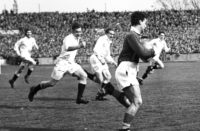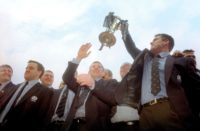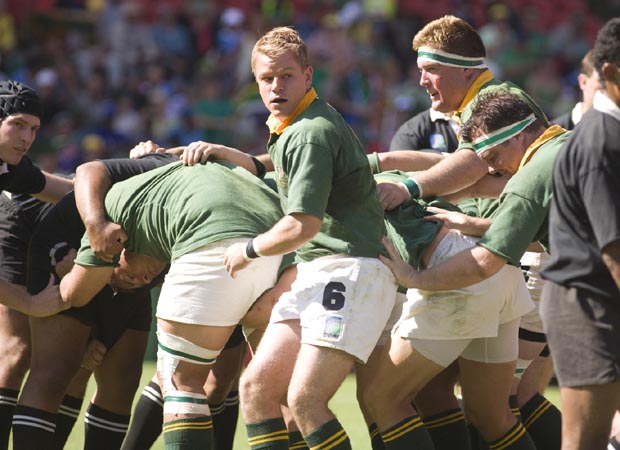 Gareth Thomas is launching his new updated biography Proud on Thursday – which is probably why that amiable old Hollywood slugger Mickey Rourke was on the Jimmy Kimmel Live talk show recently, pitching hard again to play the former Wales captain in a much-mooted biopic.
Gareth Thomas is launching his new updated biography Proud on Thursday – which is probably why that amiable old Hollywood slugger Mickey Rourke was on the Jimmy Kimmel Live talk show recently, pitching hard again to play the former Wales captain in a much-mooted biopic.
Let's see. Unfit, gnarly 62-year-old prop-like Irish American bruiser with a love of boxing plays tall, lean almost teutonic, blond Wales wing in his shining pomp. You're having a laugh?
Matt Damon would have more chance of playing Francois Pienaar. Oh sorry, he did already in Invictus! Perhaps there is hope for Rourke yet.
All of which got me thinking about rugby films or, because it's not a massive genre, films in which rugby plays a role, which widens the scope a bit. Given the eccentric, driven, heroic and often hugely eccentric characters involved I reckon Hollywood, and others, have missed a trick over the years. There are nonetheless a clutch of films to consider and unlikely cameo rugby moments in long forgotten films that you may chance upon when curled upon the settee watching TCM this winter.
Invictus, of course, is the Daddy of all rugby films grossing Warner Brothers over $122m for their initial $50m outlay. A flawed but engaging treatment of South Africa's miraculous 1995 World Cup triumph it naturally homes in on the Mandela angle – his canny adoption of the Springboks to help unite a new nation – but it also gives the basic rugby story a full airing.
There are one or two historical inaccuracies which irritate. The film makes much of the “security scare” when the South African Airways jumbo swoops down for its spectacular fly-past before the final when in fact it had been fully rehearsed two days before and the authorities knew exactly what was happening. It also makes out South Africa to be almost rank outsiders whereas with home advantage and a good build-up they were always likely to reach the semi-final at least.
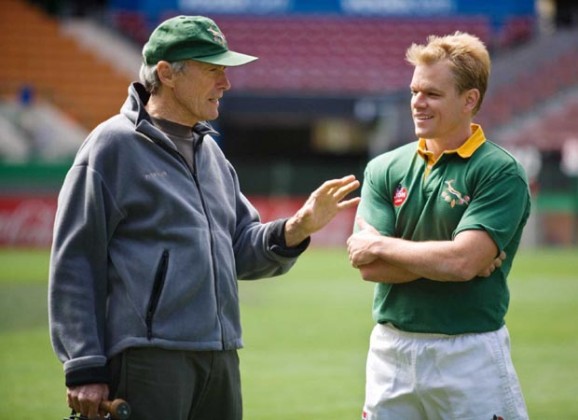
The casting of the then 40-year-old 5ft 8in All-American boy Damon as the 6ft 2in 17st epitome of Afrikaner manhood was interesting but Hollywood tends to make light of such technicalities and in fairness director Clint Eastwood and the talented Mr Damon, pretty much pulled it off.
“When I took the role I immediately went online and started reading about Francois and realised that he's a pretty big guy,” recalls Damon. “I spoke to Clint and said, ‘you know this guy is huge', and he said, ‘Hell, you worry about everything else, let me worry about that'.
“Francois invited me to his home and made me this incredible gourmet dinner. When I got to the house he answered the door and I just looked up at him. There was a pregnant pause and eventually I said, ‘I look much bigger on camera'.
“Francois was an enormous help to me. I felt a great sense of responsibility to do justice to him and the story because he has so much integrity and I believe Mandela is the greatest world leader of our time. It's incredible what they did and also what their country did.”
Pienaar himself was pleased with the final product: “Of course, there's poetic licence, but how can it be otherwise when you have such a massive story. You have to condense the issues and establish the characters very quickly and engage a largely non-rugby audience.
“As a matter of historical fact the Springboks weren't reluctantly forced to sing the new anthem, Nkosi Sikelel' iAfrika, with the Xhosa words as the film depicts. It was something we badly wanted to do ourselves and we had organised our own singing lessons sometime before the World Cup.
“Some moments, however, are so absolutely spot on particularly the scene when the team visit President Mandela's prison cell for 17 years on Robben Island and my character, Matt Damon, stretches his hands to touch the walls of the tiny cell.
“He visualises the president, a tall man, trying to live within its confines and then when we go outside he ‘sees' President Mandela breaking rocks in the baking courtyard. That's exactly how it was.”
Next in rugby's cinematic pantheon is possibly This Sporting Life, penned by former professional Rugby League player David Storey, which chronicles the sporting life and loves of Rugby League hard nut Frank Machin. Although much admired critically with two Oscar nominations it was a box office flop and perhaps dissuaded many other directors from using rugby as vehicle for a while.
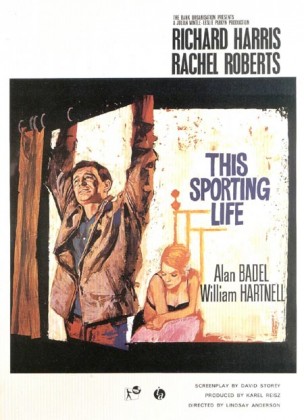
Not that Harris was overly concerned, he was having the time of his life and it was his big breakthrough movie.
“It was a great opportunity for me professionally and also a chance to ‘play' some rugby,” he told me soon before his death in 2002. “I hadn't done that since I contracted TB and dropped out of the Munster U20 team. The first thing I had to do was get fit and my initial thought was to get down to London Irish and start training with my chums.
“But there was a problem. At Irish I would have undone all my hard work in the bar afterwards. The craic would have been too good, and they would taken the piss and distracted me.
“So instead I went down to the Athletic Ground in Richmond where I knew nobody. I worked like a dog for weeks and weeks and nobody bothered me or was the slightest bit curious. I was in roaring good shape by the time we went North to start filming “We did have a bit of a ‘moment' on the first day we started filming the rugby scenes at Belle Vue, the Wakefield Trinity ground. Some of the Trinity pros and a few from Halifax as well had been roped in as extras and I could see them looking me over before the first scene. I knew exactly what they were thinking, ‘cocky film star, fancy-dan Rugby Union bloke from Limerick, we'll show him'.
“They were a scary looking bunch and I knew a ‘warm welcome' awaited in the first take. So summonsing the spirit of Thomond Park I tucked the ball under my right arm screamed murderously and charged right for the middle of them, tucking my shoulder in and using my free forearm to beat a path through the enemy, just as those Catholic storm troopers the Christian Brothers taught me at school.
“There was a huge impact – bone on bone, flesh on flesh – but I survived and filming proceeded without a hitch from the lads. It broke the ice. We worked very hard and earned our beers. The sweat was real and the bruises hard earned let me assure you.”
The only other Oscar nomination I recall for a rugby-related film is Murderball, a documentary film that looks at the Canadian wheelchair rugby team and the 2004 Paralympics although for sheer impact I thought Alive which recreated the extraordinary story of a Uruguayan old boys rugby team fighting for their lives in the Andes deserved some sort of recognition.
A number of subsequent documentary films revisiting the club, the players and the crash site have been absolutely outstanding with I Am Alive by the History Channel the pick of the crop.
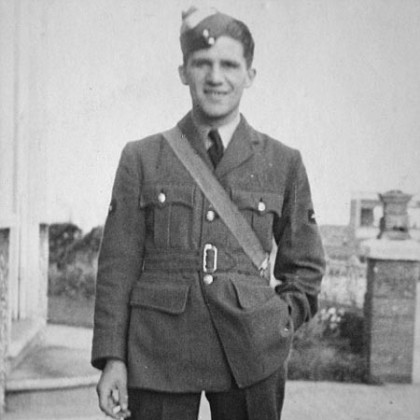
The made-for-TV film is an interesting genre and rugby boasts two little belters. Grand Slam, with the ubiquitous Windsor Davies as the blazered Valleys clubman to the fore, captures Welsh rugby in the Seventies perfectly and is dusted off whenever Wales look like they might win something. I would also recommend the less well known Old Scores which isn't quite so sharply observed but rolls along very nicely.
Elsewhere keep your eyes skinned for the French film Closet when Gerard Depardieu plays the rugby coach of a small French club who, fearing redundancy at the local condom factory, pretends to be gay thus preserving his job! It's French remember.
In The Molly Maguires – a film that gets better with the decades – there is a very tasty pick-up rugby match with just a taste of gridiron between the Welsh and Irish immigrants at a coal mine in Eckley, Pennsylvania. Richard Harris and Sean Connery star.
Che Guevara was a big rugby fan, playing in his youth to cure his asthma, and there is a rugby scene in Motorcycle Diaries while Steve Biko was another rugbyhead and Denzil Williams gets to grip with the oval ball game during a scene in Cry Freedom which shows No.8 Biko playing in a township game.
A Dry White Season has Donald Sutherland playing a legendary former Boks fly-half Ben du Toit who becomes a school teacher and discovers the horrors of apartheid and a rugby match features prominently in Maeve Binchy's Circle Of Friends.
Chris O'Donnell plays the university rugby captain smitten with Minnie Driver and there is some decent action early on.
Rugby that is.
*This article was first published in The Rugby Paper on September 7.


